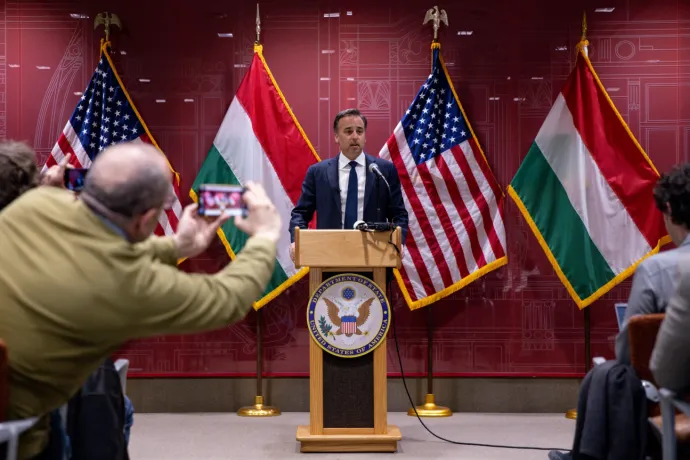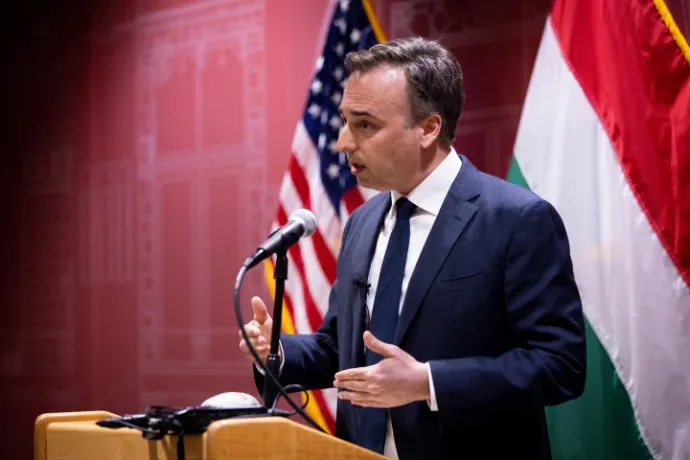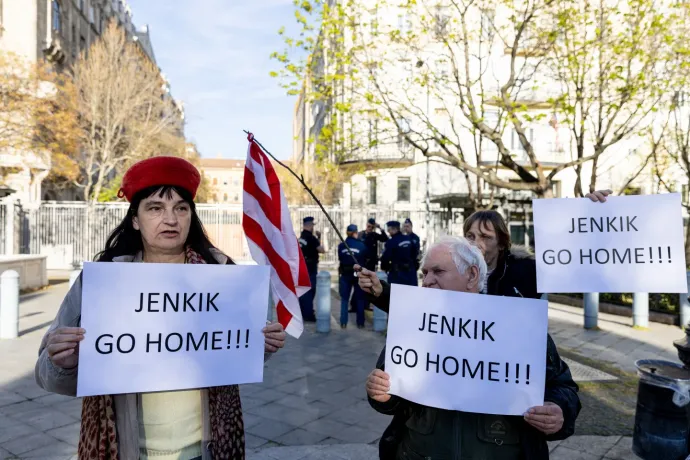US Ambassador to Hungary: We are concerned by the Hungarian government's continued close relations with Russia

In a move that is unusual in diplomacy, David Pressman, the US Ambassador to Hungary, appointed last September, announced that he would be holding a press conference at 5pm on Wednesday afternoon.
At the press conference, David Pressman said that today, the United States announced sanctions against more than 50 institutions and individuals. The sanctions are related to Russia. Hungary is affected because the list includes the Budapest-based International Investment Bank and its executives.
"We are concerned about Hungarian leaders seeking ever closer ties with Russia, despite its brutal aggression. Close economic cooperation with Russia feeds the Russian war machine and threatens the security of the transatlantic alliance." – the US ambassador said.
According to Pressman, the presence of any Kremlin-led platform in Europe is a potential threat to both the European Union and its Western allies. The ambassador also said the bank was Moscow's tool to increase its influence in Hungary and the region.
The ambassador added that the United States has repeatedly expressed its concerns about the spy bank to the Hungarian government. However, the Hungarian government has refused to acknowledge this.
The staff of the International Investment Bank headquartered in Budapest can enter the European Union even from Russia with diplomatic passports, which, as Hungary is a member of NATO, poses a particular risk to the United States, Pressman pointed out.
At the end of his announcement, Pressman underlined that
the US considers Hungary an important ally and wishes to maintain a constructive relationship with the country. Wednesday's announcement was a necessary step in this direction.
Half an hour before the ambassador's press conference, the US Treasury Department's Office of Foreign Assets Control announced sanctions against a dozen individuals and companies linked to Russia. The list included the International Investment Bank (often referred to as the "Russian spy bank") and its Hungarian-born vice president, Imre Laszlóczki, (who was previously Hungarian ambassador to Kazakhstan and Azerbaijan. Also on the sanctions list is Georgij Nugzarovich Potapov, Russian citizen and Deputy Chairman of the Board of Governors of the International Investment Bank (IIB).

Citing diplomatic sources, 444.hu had earlier speculated that the ambassador might announce a travel ban on three people close to the government or government officials.
The last time Hungary was affected by a US ban was almost a decade ago, in the autumn of 2014, when a presidential decree banned six Hungarians due to corruption – but their names were never made public (with one exception).
At today's press conference, the US ambassador answered only three questions from journalists before leaving. In response to RTL's question, Pressman did not elaborate on whether the ominous lists could be extended further if the current sanctions measures are not properly received by the Hungarian government. The ambassador merely said:
"the United States is interested in cooperating with Hungary, we are allies in the same boat."
The disagreement between the US and Hungary reached new levels because of the Hungarian government's position on Russia's war against Ukraine.
Pressman – and through him the White House – has repeatedly made clear that the Hungarian government's ambivalent attitude to Russian aggression is unacceptable. In recent months, the US has taken offence because of the following:
- the Hungarian government's obstruction of EU decision-making on sanctions in order to benefit Russian oligarchs and people in the inner circle of the Putin regime;
- the delay in Finland's accession to NATO and delaying Sweden's joining to the same;
- Hungary's continued maintenance of economic relations with Russia, in the form of cementing Russian dependence on gas, which is difficult to justify economically, as well as maintaining the Hungarian state's stake in the International Investment Bank, which is also seen as a financial front for Russian intelligence;
- and, of course, the Russian propaganda pouring out of Hungarian state-owned media, which has a tangible impact on Hungarian society's perception of the war in Ukraine.
A nationwide poster campaign was launched across Hungary this week with the support of the US Embassy, calling for the withdrawal of Russian troops from Ukraine. Minister at the Prime Minister's Office, Gergely Gulyás commented on it saying that the US embassy had launched a pro-war campaign.
During David Pressman's press conference, there was a small demonstration with about ten participants at Szabadság tér in front of the US Embassy in Budapest. They told our correspondent that they were mainly protesting against the ambassador's announcement, but also against the United States' banking manipulation, because they believe that the US banking system is collapsing and that this is what Russia is waiting for.

For more quick, accurate and impartial news from and about Hungary, subscribe to the Telex English newsletter!